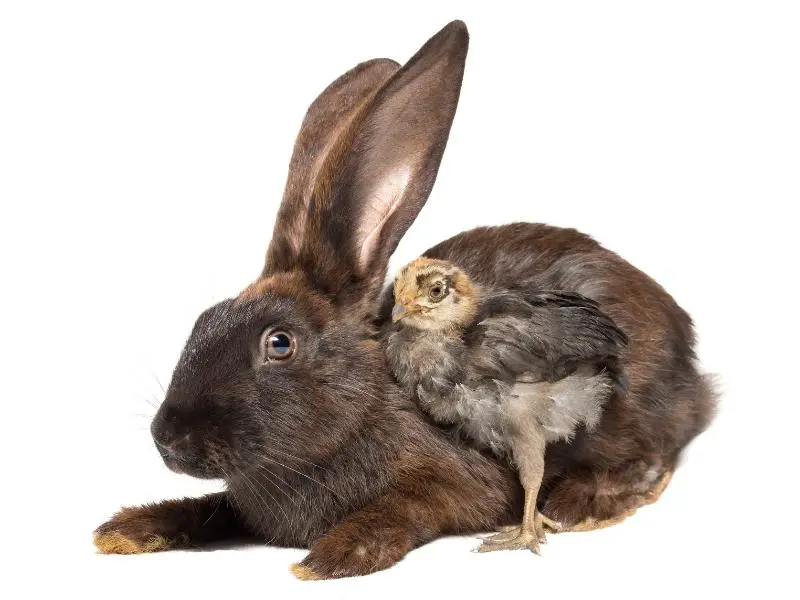At first glance, it may not seem as if rabbits and chickens have a lot in common. One is a furry mammal and the other one is a feathered bird. However, they are both small, social, and mostly outdoor pets.
So can you have a multi-species home with rabbits and chickens living together?
Rabbits and chickens can live together in a hutch or coop, especially if they are introduced while young. Chickens and rabbits will become fast friends and keep each other company. Rabbits are cleaner animals so ensure you muck out their home regularly and give them a separate hutch to sleep in.
Are there other special considerations for keeping these two animals together in the same coop or hutch? And are there benefits to keeping rabbits and chickens together?
Let’s find out.
Do Chickens Attack Rabbits? And Do Rabbits Attack Chickens?
In general, chickens won’t just attack a rabbit, and rabbits won’t attack chickens. These animals may fight if they aren’t socialized or bonded well, and this is best resolved when they are young (but more on this a little later).
If a chicken attacks a rabbit it isn’t usually violent. As chickens do, they flog and peck at each other with their wings. This is mostly to establish their pecking order (or dominance).
So it won’t be strange if your chickens exhibit this behavior with your rabbits.
It is also worth noting here that chickens are omnivores. Chickens will eat baby bunnies if they are around, so if your female rabbit (doe) has kindled, then it is best to keep her and her kittens (baby bunny) apart and separate from the chickens.
And vice versa, rabbits can hurt your chickens too. These long fluffy-eared mammals have sharp claws and they can kick too. This can hurt your chickens.
Unneutered rabbits are especially territorial. So if you keep rabbits that haven’t been neutered in the same space as your chickens, then a rabbit may bite or nip at a chicken that “trespasses” onto territory the rabbit considers as theirs.
How to Introduce Rabbits and Chickens

If you have a small homestead and space is an issue, then it may work in your favor to keep your rabbits and chickens together in the same chicken coop or hutch.
However, it does create more work for you and you need to manage these animals well so they can peacefully cohabit and share their space.
So how do you bond chickens and rabbits and raise them together?
The Importance of an Early Introduction
Even though both chickens and rabbits have gentle personalities, this doesn’t mean that they will live peacefully and be besties straight away. It takes time to introduce different animals, and this isn’t a process you should rush.
It is recommended to introduce your rabbits and chickens when they are both young. This allows both species time to get to know each other.
Moreover, the kittens and chicks are curious and adaptable, so they’ll want to meet each other.
If you introduce mature rabbits and chickens, then chances are both species may have developed aggression, fear, or other negative reactions that don’t make it an ideal roomies situation.
It is also not recommended to introduce baby rabbits to grown chickens since the chicken may either peck at the energetic kittens who are fast-moving animals or eat them if the bunnies are still small enough.
Step-by-Step Guide for Introducing Chickens and Rabbits
Never just place the rabbits and the chickens together and leave them be. Follow this guide to ensure the introduction process goes smoothly:
- Let your rabbits meet your chickens with a fence between them. If your coop is large enough, you can place your rabbits in a wire mesh cage inside the coop so the animals can “meet” each other. Do this for a few days.
- Let your rabbits and chickens run together in the same area. They may choose to interact with each other or they may ignore each other at first.
- The rabbits and chickens will eventually get used to each other and understand that they are sharing living space.
Tips for Bonding Rabbits and Chickens
Ensure there is adequate space for both the rabbits and chickens to live together comfortably.
In general, your rabbit hutch should be 4 times the size of your bunny. A small chick needs 2.5-5 square feet of space per chick, while a mature chicken needs 5-10 square feet per chicken.
Add up the space needed according to how many rabbits and chickens you have.
There should also be separate areas for the rabbits and the chickens in the hutch.
They can share a play area, but the chickens should sleep in their coop while your bunnies should sleep in their separate hutch. These animals should also eat separately as they can’t share food for health reasons.
Rabbits are clean animals so ensure you clean the hutch daily. And don’t place the rabbit hutch underneath the coop as chickens poop a lot when they sleep, and your bunnies won’t be happy.
Male rabbits should be neutered when you want them to live with your chickens.
Bucks are aggressive when they are sexually mature and may try to mate with your chickens. Or a male rabbit may feel threatened and think the chickens will hinder any chance they have of mating with the does.
Pros and Cons of Rabbits and Chickens Living Together
As with any living situation, there are pros and cons to consider when mixing your rabbits with your chickens:
Pros
- Having your chickens live together with your rabbits saves space as you only need one big area to house both species of animals.
- As social animals, the rabbits and chickens won’t feel lonely as they will have friends.
- There’s safety in numbers since rabbits and chickens are prey animals and attract the same predators.
- It’s fun to watch your bunnies interact with your chickens, and vice versa.
- Both chickens and rabbits flourish in cool weather so you don’t need to worry about one needing more heat than the other.
Cons
- With different nutritional needs, rabbits and chickens should eat separately from each other.
- Rabbits may nip at chickens if they are particularly territorial while chickens don’t like fast-moving animals and may peck at the rabbits.
- If your doe has kittens, your chickens may have a lovely meal.
- Both rabbits and chickens can carry diseases and parasites, and if you aren’t careful, an outbreak can wipe out your bunny and chicken family.
- Since bunnies are fastidious cleaners, you’ll have to clean the coop or hutch daily, and this is harder work than keeping bunnies separate from chickens.
- If you place your bunnies in a chicken coop, the wire can hurt their skin if they get too close.
Ratio of Rabbits and Chickens Living Together
For any peaceful living arrangement, balance is key. As such, it is advisable to have at least 2 rabbits and 2 chickens living together so the animals have a friend of their own species.
However, if you are starting out with one bunny, then you can introduce the young kitten to the coop of chickens. The birds will accept the bunny as one of their own.
Never keep just one chicken with a warren of rabbits as it will feel overwhelmed.
Can Rabbits and Chickens Share Food?
While sharing is caring, this doesn’t apply when it comes to mealtimes for your rabbits and chickens.
The feed chickens eat is high in protein and calcium, and this isn’t a requirement of a healthy diet for a rabbit. It can cause severe gastrointestinal blockages for your rabbits, and if left untreated, it can be fatal.
Moreover, chicken feed is high in calories, and this can lead to obesity if your rabbits regularly eat your chicken’s food. If your bunny is obese, it will lower their quality of life as they will suffer from joint pain, breathing issues, and muscle weakness.
Chickens need calcium for the eggs they lay, but a diet rich in calcium leads to kidney stones and other complications for your rabbits.
What Other Animals Can Live With Rabbits?
Besides chickens, rabbits can also live with other animals (though not necessarily in the rabbit’s hutch):
- Dogs (but beware of larger dog breeds that may want to prey on your fluffball)
- Cats (but ensure you introduce these two animals properly and don’t leave them alone or unsupervised)
- Guinea pigs (ensure they and your rabbits have enough space)
- Squirrels
- Chinchillas
Rabbits and Chickens: Good Bedfellows
Rabbits and chickens can live together happily and healthily. However, it does mean you have your work cut out for you. Remember to:
- Introduce your kittens and chicks when they are young
- Not rush the introduction process
- Have at least 2 bunnies and 2 chickens for balance
- Keep your bunnies and your chickens separate when they sleep and eat
- Predator-proof the coop or hutch your chickens and rabbits live in
- Check your rabbits and chickens for diseases and pests regularly, and act swiftly when necessary
- Have fun and see how your bunnies and chickens interact
Enjoy and good luck!

